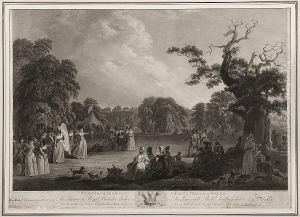Cornelis Apostool Paintings
Cornelis Apostool was a Dutch artist and cultural administrator born on August 6, 1762, in Amsterdam. His contributions to the art world span across several disciplines, including engraving, painting, and directing cultural institutions, which have cemented his legacy in the Dutch art history. Apostool started his artistic journey in the realm of engraving under the tutelage of Reinier Vinkeles, a renowned engraver of the time. His early works were primarily engravings, through which he developed a keen eye for detail and composition. However, as his career progressed, Apostool expanded his repertoire to include painting, showcasing a versatile talent in both mediums.
Throughout his life, Apostool was deeply influenced by the cultural and artistic movements of his time, particularly Neoclassicism, which is evident in the style and subjects of his works. His engravings and paintings often depicted classical themes, landscapes, and portraits, characterized by their clarity, precision, and adherence to classical ideals of beauty. Aside from his artistic production, Cornelis Apostool played a significant role in the Dutch art scene through his involvement in various cultural institutions. In 1808, he was appointed as the director of the Koninklijk Museum (Royal Museum) in Amsterdam, now known as the Rijksmuseum, one of the most prestigious museums in the Netherlands. During his tenure, he was instrumental in the expansion of the museum's collection and its accessibility to the public.
In 1820, Apostool became the director of the Royal Academy of Fine Arts in Amsterdam, further solidifying his influence in the Dutch art world. His leadership roles in these institutions allowed him to advocate for the arts, support emerging artists, and contribute to the development of the Netherlands' cultural policies and artistic education. Cornelis Apostool’s contributions were not limited to his artistic output and administrative roles; he was also a member of various artistic societies, through which he engaged with contemporary artists and intellectuals, fostering a vibrant artistic community in the Netherlands.
Cornelis Apostool passed away on August 19, 1844, in Amsterdam. His legacy lives on through his artworks and the institutions he shaped, which continue to play a crucial role in the preservation and promotion of Dutch art and culture. Apostool's life and career reflect the dynamic interplay between artistic creation and cultural administration, illustrating the profound impact one individual can have on the arts and society.



